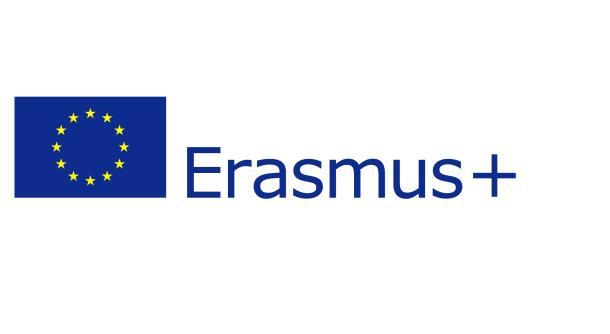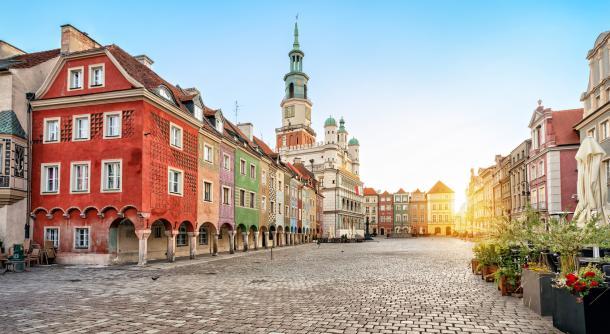Erasmus
Under the Erasmus+ exchange program, WSB Merito University students can study or do a work placement abroad.
Erasmus+ is an EU mobility program for education, training, youth and sport. Its budget amounts to €26.2 billion. The 2021-2027 program places a strong focus on social inclusion, the green and digital transitions, and promoting young people’s participation in democratic life. It supports priorities and activities set out in the European Education Area, Digital Education Action Plan and the European Skills Agenda. It brings opportunities to people of all ages, enabling them to learn and share experiences at host institutions throughout and beyond Europe. In the first place, it allows students to spend a semester or do a practical placement in another European state during their time at university.
You can find more about Erasmus+ by visiting its page.
To be eligible for student mobility under Erasmus+, you must have completed the first year of study at a university participating in the program. The best thing about the program is that you do not have to pay any additional tuition fees at the host university. Another great feature of Erasmus+ is that you can get grant money to help you cover the cost of living while studying or doing a work placement in a foreign country.

Erasmus+ is an EU mobility program for education, training, youth and sport. WSB Merito University in Poznan has been actively participating in the program since 1999. Every year we offer our students the possibility of enhancing their knowledge and acquiring new experiences in one of our partner schools or partner companies across Europe. Student mobility retains a position of central importance at WSB Merito University in Poznan. Since 1999 over 720 WSB students have taken part in the program.
Erasmus Charter 2021-2027 - WSB Merito University in Poznan

Erasmus Policy Statement
Strategy and objectives
Our Erasmus Policy Statement covers the following activities:
1. Erasmus Key Action 1 (KA1) - Learning mobility: The mobility of higher education students and staff
2. Erasmus Key Action 2 (KA2) - Cooperation among organizations and institutions: Partnerships for Cooperation and exchanges of practices
By participating in the Erasmus+ program WSB Merito University in Poznań aims to increases not only the number of international students, faculty members, and administrative staff but also makes it possible for its own students, and staff to go abroad and gain competencies and skills that would be difficult to gain in the home institution. By participating in the Erasmus+ program we aim to create an international experience for staff and students, increase cross-cultural awareness and diversity, build environment-friendly awareness, shape civic engagement attitudes, and prepare staff and students for a global future. To achieve these aims we have developed a set of more specific objectives. By participating in Erasmus+ we intend to:
1) Promote sustainable development for education that covers diversity, intercultural awareness, tolerance, social responsibility and ethics
2) Increase availability of highly qualified manpower equipped with digital, intercultural and multilingual skills
3) Provide access to quality higher education by collaborating with foreign partners whose academic profiles are compatible with ours and who, if possible, have international accreditations
4) Improve skills and competencies of students and staff through mobility schemes to increase their employability
5) Strengthen cooperation between higher education institutions and business partners
6) Enhance the internationalization at home
7) Develop programs and curricula with participating institutions, which is an initial step towards a European Education Area
8) Enable students and staff to benefit linguistically, culturally and professionally from a different environment
9) Further develop towards a higher education institution that is perceived as international, innovative, modern and socially responsible
10) Benefit from practices, policies and management processes of partner institutions so that we can modernize and innovate our own practices, policies, management and teaching
11) Establish new professional contacts that will help develop joint projects
Implementation
WSB Merito University in Poznań, apart from having great and long experience in managing Erasmus and non-Erasmus projects, has all the necessary resources (financial, human, infrastructural, organizational) to implement and manage successfully Action KA1 and Action KA2. While implementing the above-mentioned actions we will make sure that new priorities are included. The new priorities are: digital mobility management, environment-friendly practices, civic engagement and inclusive education. By implementing these priorities we intend to enhance quality of student and staff mobility in terms of experience, knowledge, attitudes, values; and further develop our university as an institution that is modern and innovative.
Action KA1 – implementation stages
The KA1 activities are in line with WSB Merito University's strategic objectives such as: higher global recognition; creating an international experience for staff and students; increasing cross-cultural awareness and diversity; building environment-friendly awareness; shaping civic engagement attitudes; and prepare staff and students for a global future.
All the activities within Action KA1 will be coordinated, managed, and administered by the International Relations Office. The IRO has enough human resources to implement and manage these activities successfully. In the first place we will define a scope of responsibilities for particular IRO team members to avoid the overlapping of tasks. The main division of tasks will go along the following line: incoming/outgoing students; incoming/outgoing staff. We intend to engage WSB ESN in some of the KA1 Activities. We plan to implement the KA1 Activities according to a three-stage scheme.
Stage 1 – preparatory phase, before mobilities start:
- review of and signing existing interinstitutional agreements, finding new partners and signing agreements,
- preparing a course-catalog,
- developing qualification and selection procedures,
- launching a promotional campaign on Erasmus+ mobility opportunities among students, teaching staff, and administrative staff by means of different communication channels (emailing, Internet, Intranet, Extranet, social media, posters, meetings),
- building a buddy system,
- recruitment (outgoing) and acceptance (incoming) of candidates,
- providing all the necessary information for incoming participants (cultural, formal and organizational issues)
- collecting all the necessary documents, signing agreements with the beneficiaries, making payments of grants according to the Erasmus+ program rules, forwarding appropriate documents to the partner university,
- preparation of welcome packs for incoming participants,
- providing assistance with accommodation, health care, visa, insurance etc.
- pick-up service from the airport/train station/bus station
- organizing orientation days for newly-arrived participants (the participants will learn about procedures, regulations, and some other formal issues pertaining to the host country and university)
- preparation of the participants for outgoing mobility in terms of cultural, technical, formal and social issue by organizing appropriate courses
Stage 2 – realization of mobilities
- monitoring outgoing and incoming mobilities in cooperation with partner institutions
- providing institutional support for the beneficiaries, especially in emergency situations or conflict-related situations
- staying in touch with the participants and partner institutions via email, phone, Internet communicators
- organizing inter-cultural events/sessions/courses
-providing buddy system
- compiling adequate documents (certificates, reports, agreements, and questionnaires)
Stage 3 – after the mobility
- collecting different certificates, reports, and questionnaires,
- dissemination of the project results,
- ensuring the results are sustainable,
- creating Erasmus+ ambassadors who will be able to share their experience with future participants,
- submitting by WSB the final report in due time,
- analysis of the results and making conclusions about further development of activities,
- implementing good practices and innovative solutions.
Action KA2 – implementation stages
Within Action KA2 WSB University intends to participate in two activities: Partnership for Cooperation and exchanges of practices, and Partnerships for Innovation. These activities are in line with WSB’s strategic objectives such as increasing a degree of internationalization, modernization, building an innovation-driven institution, developing high quality study program and curricula, and educating students for a global future. The implementation of Action KA2 will make it possible for WSB Merito University in Poznań to integrate the idea of European Education Area and put in practice. By participating in these activities we intend to achieve the following:
- modernizing teaching methods by implementing good practices in collaboration with partner universities,
- strengthening existing and building new partnerships in order to enhance capacity and potential at international level,
- developing joint curricula and content that will help students to be good global and socially responsible citizens,
- developing content delivery methods that are in line with the “flipped classroom” principles,
- developing online solutions for delivering teaching content in a more efficient manner,
- becoming part of European Education Area,
- implementing good practices in the area of digitalization,
- designing joint interdisciplinary study programs in order to increase employability of students,
- enhancing research potential of the partner universities involved.
Stage 1 - preparatory phase
- needs analysis
- review and selection of partners
- consultation with partner universities and specifying key areas of the project realization
- establishing the project team and defining a scope of responsibilities,
- setting performance measures and goals, project results, and ways to disseminate them
Stage 2 – realization of activities
- ongoing monitoring and providing support
- interim evaluation of the project realization
- staying in touch with the participants and partner institutions via email, phone, Internet communicators
- organizing inter-cultural events/sessions/courses
-providing buddy system
- compiling adequate documents (certificates, reports, agreements, and questionnaires)
Stage 3 – after mobility
- dissemination of the project results,
- ensuring the results are sustainable,
- submitting final reports in due time,
- analysis of the results and making conclusions about further development of activities,
- putting in practice good practices and innovative solutions.
As in the case of Action KA1 the primary unit responsible for administering the KA2 activities will be the International Relations Office. However since the activities require specific know-how and expertise it will be necessary to create project managers and project teams that will be able to facilitate the implementation of the project in a more efficient way.
In implementing the KA1 and KA2 activities WSB intends to follow transparency, gender equality, and non-discrimination principles.
Envisaged Impact of Erasmus
The primary impact that WSB Merito University expects to achieve by participating in the Erasmus+ Program is to raise its degree of internationalization which translates directly into its position in terms of global recognition. Erasmus+ is also expected to have a positive impact on personal, professional, and academic development of the participants, which can be conducive to transition to employment for students and career development for staff members.
We expect the staff members to acquire new skills, deepen their foreign language skills, explore new teaching methods, and implement good practices. It is also expected that the student mobilities will enrich students’ professional and academic lives as well as promote openness, adaptability, civic engagement, flexibility, enhance language learning, intercultural skills, self-reliance and self-awareness. All of these will later contribute to the successful transition of the student to employment and boost their employability.
The realization of the Erasmus+ Program will give WSB Merito University in Poznań an opportunity to further improve the quality of teaching methods, upgrade the curriculum, become an integral part of the European Education Area, and develop the institution to meet higher standards. We expect to extend and deepen the ties between WSB and partner universities, acquire new contacts through which we will be able to successfully develop and carry out new projects.
The achievements and successes, and later the employment rates of the participants will allow us to attract more students (both domestic and international) in the future. The impact on staff and students may be particularly shown in the following aspects:
• incorporating different teaching methods,
• project management skills development,
• digital skills development,
• social skills development,
• motivation to work in a multi-disciplinary team,
• motivation for professional training and skills development.
In order to evaluate the impact of WSB Merito University’s participation in the Erasmus Program on our institution it is necessary to set targets and indicators that will help us monitor this impact. In the case of KA1 Action our long-term target is to increase mobility rates for students and staff (both outgoing and incoming) over a period of 6 years. In the short term (yearly basis) we intend to ensure that the number of participants in mobilities (including students with fewer opportunities) reaches or exceeds the figure resulting from the agreement between the National Agency and WSB Merito University. We also intend to increase the number of students and staff interested in participating in Erasmus+. Apart from that we intend to enhance quality of mobility in terms of the participants’ overall satisfaction (including support for participants) with the Erasmus experience and skills development especially as it comes to civic engagement, environment awareness, and digital competencies.
To find out if our targets are met we intend to use quantitative and qualitative indicators. The quantitative indicator will incorporate the following data:
- the number of participants (including students with fewer opportunities) interested in, qualified for and taking part in Erasmus+ mobility for each group of participants,
- the data showing the above as compared with previous years,
- the total number of participants in year one as compared to the final year’s number expressed as a percentage ratio.
The qualitative indicators will be based on the results from individual participants’ reports submitted on Mobility Tool+ and interviews with the participants. We expect the substantial majority of the participants to rate their overall satisfaction with the Erasmus+ experience as good or higher. The same indicators will be used for skills development with special focus on civic engagement, environment awareness and digital competencies. The data collected in this way will be thoroughly analyzed and will be the basis for drawing conclusions and recommendations for the next year so that we will be able to continuously monitor and take appropriate measures.
In the case of KA2 Action we intend to use the following performance measures and indicators:
- compatibility ratio as regards the objectives of the project and the objectives of the strategy,
- adequacy ratio of essential content, the project structure, and relevant methodology,
- modernization degree expressed in opinion polls,
- cooperation quality degree expressed in opinion polls.
The measures will be taken over a pre-defined period and compared later on.
Promotion and Implementation of New Principles
Principle of Non-Discrimination
WSB Merito University in Poznan has all the necessary measures in place to ensure non-discrimination of any individuals or groups of individuals “based on sex, race, color, ethnic or social origin, genetic features, language, religion or belief, political or any other opinion, membership of a national minority, property, birth, disability, age or sexual orientation". These measures are in compliance with Article 21 of the Charter of Fundamental Rights of the European Union. They are reflected in WSB’s formal documents such as: Study Regulations, WSB By-Laws, Erasmus Recruitment Regulations for Student Mobility and Staff Mobility, and Erasmus Grant Regulations.
All of these documents are available to staff and students on the Intranet and Extranet. None of our students and staff are excluded from access to information. All of them (no matter if they are full-time or part-time students, no matter if they are full-time or part-time staff, no matter if they are Polish or non-Polish) are provided with transparent principles, guidelines and information. The information about Erasmus opportunities and Erasmus procedures are disseminated among our students and staff through multiple channels of communication: emailing, Internet, Intranet, Extranet, social media, posters, information meetings. Apart from that WSB Merito University has engaged ESN (Erasmus Student Network) to promote the idea of Erasmus through their own channels and contacts. Additionally WSB Merito University has appointed a Rector’s Representative for the Disabled who is responsible for students with disabilities and coming from disadvantaged environments. The Representative is able to reach out to such students with appropriate information on Erasmus opportunities.
Principle of Erasmus Without Paper
Digitalization of administrative and teaching processes has always been of great significance at WSB Merito University in Poznań. WSB Merito University in Poznan was one of the first higher education institutions in Poland to implement online solutions for student services and for teaching. The goal was to reduce the amount of paper, make communication with students and staff more efficient, and modernize teaching. To this end WSB Merito University developed and implemented the Extranet, launched an e-learning platform Moodle and recently developed a mobile application called “Moja WSB” (English: My WSB). Thanks to that the majority of student services are carried out online (including processing students’ applications, requests, Dean’s decisions, appeals to decisions etc.). The e-learning platform Moodle has become part of the overall teaching process. All of these tools are also available for international students. Right now WSB Merito University is working on the implementation of a more advanced digital system that should result in shifting completely administrative and operational processes and management to online. Part of the system is digital mobility management.
The European Card Initiative fits in with WSB Merito University’s digitalization initiatives. We foster the idea of Erasmus Without Paper very much and are willing to take advantage of its potential. We intend to go along the guidelines for the implementation of the Erasmus Without Paper network according to the following timeline:
- 2021 - to manage inter-institutional agreements and online learning agreements
- 2022 - to send and receive student nominations and acceptances
- 2023 - to exchange transcripts of records related to student mobility.
To achieve these goals we intend to engage our IT Department for making our IT systems compatible with the European Card Initiative. Moreover we plan on communicating at face-to-face meetings this idea to our authorities (Rector, Deans, Vice Deans) and staff (Registrar’s Office, Admissions Office, Career Services Office, Center for Instructional Design and Teaching Methodology).
We undertake to promote the Erasmus+ Mobile App to incoming and outgoing students by sharing the information about it on the Internet, social media, the Extranet; at face-to-face meeting; by email; by reaching out to them through student organizations, and buddies. In the years to come we also intend to build a group of Erasmus+ Mobile App ambassadors who could share their experiences with students not familiar with the concept.
Principle of Environment-Friendly Practices and Civic Engagement
WSB Merito University in Poznań in its day-to-day activities and operations makes an effort to act in an environment-friendly manner. We have put in place a number of initiatives whose aim is to build our students’ and staff’ pro-ecological attitudes and as a result reduce a negative impact on the environment. The most visible one is recycling. Our infrastructure is equipped with recycling bins in appropriate colors and stickers. As a result of the development of online services we have managed to reduce the amount of paper. Our students and staff are encouraged to use these online tools. We also make an effort to use environment-friendly technologies and follow a minimum-waste policy in terms of electric power and water. In terms of education our study programs have components that cover environment protection issues.
We undertake to follow the above-mentioned practices and additionally we intend to:
- promote environmentally sustainable and responsible behavior among the Erasmus participants by organizing training courses/workshops on environment-friendly practices,
- to encourage the usage of environment-friendly means of transportation such as public transport, city bikes, and walking while getting around the city and outside,
- to promote to choose by the participant the least fuel-consuming means of travel abroad, e.g. if it is possible to take a train or a bus rather than a plane then the participant should consider taking a train/bus,
- engage the Erasmus participants in local environment-friendly projects such as collecting garbage in the forest, planting trees etc.
WSB Merito University in Poznań is involved in building and promoting civic engagement and active citizenship among its students and staff by organizing volunteer events, projects and the like. WSB students are able to get involved in different initiatives either by joining WSB student societies or by participating in the events organized these societies. International students are not an exception. They are encouraged to join such societies and actively engage themselves in various initiatives, especially they are encouraged to get involved in ISC (International Student Council). These two organizations’ objectives are to integrate and engage international students not only on campus but outside so that they can contribute with their knowledge, skills and experience to local communities. We intend to take the following measures to promote civic engagement and active citizenship:
Before mobility
- organizing training courses in for outgoing students during which they will get familiar with the concept of civic engagement so that they can be prepared for getting involved in civic initiatives abroad,
- providing information for incoming students on how they can get involved in active citizenship events at our university; we intend to engage ISC for sharing their experiences,
- organizing in partnership with ISC orientation weeks for incoming students so that they can easily get integrated not only with WSB Merito University students but with local community.
During mobility
- engaging students in various events and activities organized by ISC (e.g. meetings with local authorities; visits to kindergartens to teach cultural awareness and tolerance; blood donation events; plant-your-tree events, save energy events; help poor children initiatives; etc.)
- building a group of ambassadors who could spread and promote the idea of civic engagement and active citizenship once their mobility is over
- sharing students’ experiences on the Internet and social media
After mobility
- promoting civic engagement activities through their ambassadors
- sharing the experience on social media, conferences, in articles.

Quality of Mobilities
WSB Merito University in Poznań’s commitment to automatic recognition of a higher education qualification and learning outcomes from a mobility period is reflected in its adherence to the Bologna Process principles and European Credit Transfer and Accumulation System. We have been successfully using these principles and ECTS for many years now. For a student to complete one academic year they have to gain 60 ECTS credits. The number of credits for each course is calculated on the basis of the student’s workload defined by classroom work (contact hours) and own work (outside the classroom). In the case of mobility with institutions that do not use the ECTS system WSB has guidelines of transferring credits into ECTS credits. We are committed and intend to automatically and fully recognize a student’s learning outcomes from a mobility period at a partner university as agreed beforehand in a learning agreement and confirmed in the Transcript of Records. We intend to have in place the following elements:
1. a course catalogue on the website,
2. a learning agreement (for studies and work placements), signed by three parties (sending institution, receiving institution, student) before the start of mobility;
3. a Transcript of Records indicating the number of credits earned and grades achieved; in the case of work placements a Transcript of Work
d) proof that the work abroad has been recognized as outlined in the learning agreement.
The procedure for full recognition of credits is as follows:
1 Before mobility a student completes a Learning Agreement with a list of courses and ECTS to be realized at a partner institution.
2. The Learning Agreement is approved by the Vice Dean responsible for recognizing learning outcomes.
3. In the event a student changes his/her Learning Agreement during mobility the Vice Dean is notified of the changes and approves of them.
4. A student completes his/her mobility period.
5. The Registrar’s Office receives the Transcript of Records of a student on the basis of which automatically recognizes his/her credits and learning outcomes.
6. If a student fails to achieve learning outcomes and credits as agreed beforehand in a learning agreement then the Vice Dean will request that a student should make up for missing credits in due time without having to repeat a semester.

Staff mobility is an integral part of the internationalization strategy at WSB Merito University in Poznań. We make sure that both teaching and administrative staff are provided with mobility opportunities. WSB Merito University actively promotes staff mobility among its employees. In the first place staff mobility is not restricted to full-time staff. Part-time staff may benefit from it as well. This is clearly stated in the Erasmus Recruitment Regulations for Staff Mobility and is communicated to staff by email and via the Extranet.
Promotion
We use the following methods to promote staff mobility:
- email: the information about staff mobility is sent on a regular basis by the Dean’s assistant (in the case of teaching staff) or Vice Chancellor’s assistant (in the case of administrative staff),
- the Intranet and the Extranet: the information on staff mobility and its advantages is placed on the Intranet and Extranet
- face-to-face meetings: the Dean promotes the idea of Erasmus mobility at regular meetings with Program Managers whose job is to encourage teaching staff to participate in mobility; in the case of administrative staff it is the Head of International Relations Office who promotes staff mobility during regular meetings with Heads of Departments,
- involvement of beneficiaries: the former Erasmus participants share their experiences with their colleagues after completing their mobility period,
- social media: we encourage the participants to share their experience on social media
Support
WSB Merito University supports staff mobility by:
- providing assistance in organizing mobility (e.g. the International Relations Office contacts partner institutions about mobility options, provides contacts for the participants, helps with paperwork),
- Rector’s role: the Rector encourages teaching staff to use mobility for establishing contacts at partner universities with the purpose of joint research initiatives and projects,
- including mobility time in working time,
- in extraordinary cases by providing some extra funding.
Recognition
Once the participant completes his/her mobility (confirmed by a Letter of Attendance), completes an online mobility survey, and submits a report or presentation about their experience, the mobility gets recognized by either the Dean (teaching staff) or the Head of Department (administrative staff) as part of the participant’s professional development.

Visibility
We intend to promote the Erasmus+ Program activities on our Polish webpage and English webpage. Apart from that we intend to use the following methods to promote the activities:
- posting information and articles on the Extranet,
- using social media for sharing information and updates on the ongoing and completed activities,
- publishing articles in student magazines,
- sharing the experience with business partners and local authorities,
- giving presentations at conferences,
- providing information on the Erasmus activities in surveys/questionnaires compiled for different governmental and nongovernmental agencies,
- informative meetings for staff and students at WSB Merito University,
- exhibitions,
- EU dissemination platforms,
- local press,
- professional networks: teaching associations, accrediting associations, professional associations, etc….
- thematic seminars.
By using various methods we plan to reach out to multiple stakeholders (internal and external).


